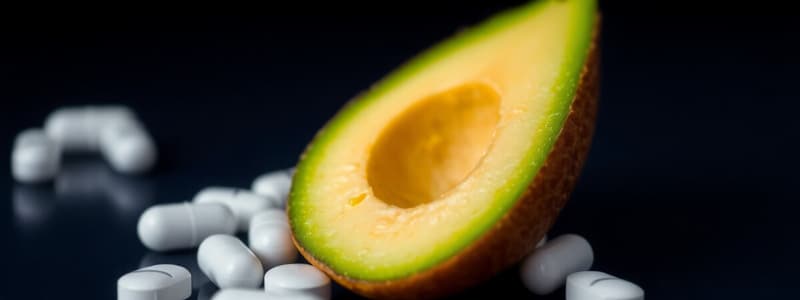Podcast
Questions and Answers
What is the term used to describe an interaction resulting from a physical, chemical, or physiologic relationship between a drug and a nutrient or food?
What is the term used to describe an interaction resulting from a physical, chemical, or physiologic relationship between a drug and a nutrient or food?
- Pharmacokinetic interaction
- Food-Drug interaction (correct)
- Drug-Nutrition interaction
- Pharmacodynamic interaction
Which of the following is NOT a way in which foods can affect the action of medications?
Which of the following is NOT a way in which foods can affect the action of medications?
- Delaying gastric emptying
- Enhancing drug absorption (correct)
- Decreasing GI pH
- Stimulating bile production
Which food product can increase drug absorption by improving the solubility of lipid-soluble drugs?
Which food product can increase drug absorption by improving the solubility of lipid-soluble drugs?
- Grapefruit juice (correct)
- Oranges
- Licorice
- Ginger
Which of the following medications is recommended to be taken on an empty stomach due to its interactions with certain foods and drinks?
Which of the following medications is recommended to be taken on an empty stomach due to its interactions with certain foods and drinks?
What is the major macronutrient in enteral or parenteral nutrition that enhances systemic clearance and can affect the disposition of drugs like theophylline?
What is the major macronutrient in enteral or parenteral nutrition that enhances systemic clearance and can affect the disposition of drugs like theophylline?
Which component of grapefruit juice is a known inhibitor of CYP3A4, leading to increased levels of certain drugs in the bloodstream?
Which component of grapefruit juice is a known inhibitor of CYP3A4, leading to increased levels of certain drugs in the bloodstream?
Which of the following medications does ginger interact with by potentially increasing the chances of bruising and bleeding?
Which of the following medications does ginger interact with by potentially increasing the chances of bruising and bleeding?
What percentage of overall drug metabolism are CYPs responsible for, and what factor can enhance the activity of certain CYPs?
What percentage of overall drug metabolism are CYPs responsible for, and what factor can enhance the activity of certain CYPs?
Which of the following foods can bind to antiepileptic agents, resulting in reduced drug absorption?
Which of the following foods can bind to antiepileptic agents, resulting in reduced drug absorption?
What is the interaction between warfarin and green leafy vegetables primarily due to?
What is the interaction between warfarin and green leafy vegetables primarily due to?
Renin-angiotensin system inhibitors can lead to hyperkalemia when consumed with foods high in:
Renin-angiotensin system inhibitors can lead to hyperkalemia when consumed with foods high in:
What is the recommended way to take levothyroxine to avoid interactions with certain foods and drinks?
What is the recommended way to take levothyroxine to avoid interactions with certain foods and drinks?
Which component of grapefruit juice is known to inhibit CYP3A4, affecting the metabolism of various drugs?
Which component of grapefruit juice is known to inhibit CYP3A4, affecting the metabolism of various drugs?
Which medication can interact with ginger and increase the risk of bleeding?
Which medication can interact with ginger and increase the risk of bleeding?
What dietary factor can decrease the effectiveness of certain anticoagulant medications?
What dietary factor can decrease the effectiveness of certain anticoagulant medications?
What effect does a high-fat diet have on the activity of certain CYPs responsible for drug metabolism?
What effect does a high-fat diet have on the activity of certain CYPs responsible for drug metabolism?
Which factor can enhance the activity of certain CYPs in the body?
Which factor can enhance the activity of certain CYPs in the body?
What is the effect of dietary calcium on the absorption of tetracycline antibiotics?
What is the effect of dietary calcium on the absorption of tetracycline antibiotics?
Which type of medications can interact dangerously with aged and fermented foods?
Which type of medications can interact dangerously with aged and fermented foods?
What is the effect of calorie-restricted diet on the activity of CYPs responsible for drug metabolism?
What is the effect of calorie-restricted diet on the activity of CYPs responsible for drug metabolism?
How does obesity affect the activity of CYP2C9?
How does obesity affect the activity of CYP2C9?
Which of the following statements is true regarding drug interactions with fruit juices?
Which of the following statements is true regarding drug interactions with fruit juices?
Flashcards
Food-Drug Interaction
Food-Drug Interaction
An interaction that occurs when a food or nutrient affects the action of a medication.
Grapefruit Juice
Grapefruit Juice
A common food that can increase drug absorption by improving the solubility of lipid-soluble drugs.
Levothyroxine
Levothyroxine
A medication that is recommended to be taken on an empty stomach to avoid interactions with certain foods and drinks.
Bergamottin
Bergamottin
Signup and view all the flashcards
Ginger and Anticoagulant/Antiplatelet Drugs
Ginger and Anticoagulant/Antiplatelet Drugs
Signup and view all the flashcards
Processed Foods
Processed Foods
Signup and view all the flashcards
CYPs
CYPs
Signup and view all the flashcards
High-protein Diet
High-protein Diet
Signup and view all the flashcards
Grapefruit Juice Interaction
Grapefruit Juice Interaction
Signup and view all the flashcards
Dairy Products Interaction
Dairy Products Interaction
Signup and view all the flashcards
Vitamin K Interaction
Vitamin K Interaction
Signup and view all the flashcards
Potassium Interaction
Potassium Interaction
Signup and view all the flashcards
Tyramine Interaction
Tyramine Interaction
Signup and view all the flashcards
Levothyroxine Administration
Levothyroxine Administration
Signup and view all the flashcards
Enteral/Parenteral Nutrition Interaction
Enteral/Parenteral Nutrition Interaction
Signup and view all the flashcards
Ginger Interaction
Ginger Interaction
Signup and view all the flashcards
CYP3A4 Inhibition
CYP3A4 Inhibition
Signup and view all the flashcards
High-Protein Diet Interaction
High-Protein Diet Interaction
Signup and view all the flashcards
Vitamin K Antagonism
Vitamin K Antagonism
Signup and view all the flashcards
Calorie-Restricted Diet Interaction
Calorie-Restricted Diet Interaction
Signup and view all the flashcards
Fasting Interaction
Fasting Interaction
Signup and view all the flashcards
Study Notes
Food-Drug Interactions: Key Concepts
- Food-drug interaction: A result of physical, chemical, or physiological relationships between a drug and nutrient/food.
Mechanisms of Food-Drug Interactions
- Drug absorption: Factors like gastric emptying, bile production, and intestinal pH influence drug absorption. Foods can delay emptying, stimulate bile, or alter pH, thus affecting drug absorption.
- Drug metabolism: Cytochrome P450 enzymes (CYPs) are crucial for drug metabolism. Foods can modulate CYP activity, affecting drug clearance and efficacy.
- Drug excretion: Foods can influence the rate of drug excretion.
- Drug action: Foods can directly influence the drug's physiological effects on the body.
Specific Food-Drug Interactions
- Grapefruit juice: Contains bergamottin, an inhibitor of CYP3A4, increasing the blood levels of certain drugs.
- Ginger: Potential interaction with anticoagulants and antiplatelet drugs, potentially increasing bleeding risk.
- High-fat meals: Can delay gastric emptying and alter drug absorption.
- High-protein and high-fat diets: Can enhance activity of some CYPs.
- Dairy products: Can hinder absorption of certain drugs, like antiepileptics.
- Vitamin K-rich foods (green leafy vegetables): Interaction with anticoagulants (e.g., warfarin), altering vitamin K metabolism and potentially affecting blood clotting.
- Tyramine-rich foods: Interaction with antidepressants, potentially leading to hypertensive crisis.
- Potassium-rich foods: Interaction with renin-angiotensin system inhibitors, possibly increasing potassium levels (hyperkalemia).
Drug Administration Considerations
- Levothyroxine: Should be taken on an empty stomach to avoid interference with food.
- Certain antibiotics (e.g., tetracycline): Absorption is reduced when taken with calcium-rich foods.
- Medications for hypertension and heart disease: Ginger may interact in such a way as to lower blood pressure.
General Principles
- Foods can negatively or positively impact drug efficacy.
- Thorough knowledge of specific interactions is essential.
- Consulting with a healthcare professional is crucial for safe drug administration and to ensure avoiding interactions.
- Awareness of individual patient's nutrition habits and health status is crucial for medication management considerations.
Dietary Considerations for Medications
- Fasting: Can affect CYP activity, influencing drug metabolism.
- Calorie-restricted diets: Can suppress CYP activity.
- Obesity: Can decrease CYP activity, potentially altering drug clearance.
CYP Enzymes
- CYPs account for a significant portion of drug metabolism (e.g., 90%).
- Certain dietary factors (high-fat diets) can enhance CYP activity, while others (e.g., high-protein diets) suppress it.
Studying That Suits You
Use AI to generate personalized quizzes and flashcards to suit your learning preferences.
Description
Explore the critical concepts of food-drug interactions in this quiz. Understand how various foods can influence drug absorption, metabolism, excretion, and action, and learn about specific interactions such as those with grapefruit juice and ginger. Test your knowledge on how nutritional elements can impact medication efficacy.




